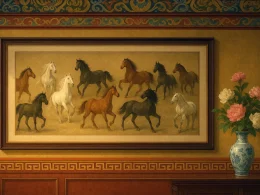Here in the Eighth-month the waters of the lake
Are of a single air with heaven,
And a mist from the Yun and Meng valleys
Has beleaguered the city of Youzhou.
I should like to cross, but I can find no boat.
...How ashamed I am to be idler than you statesmen,
As I sit here and watch a fisherman casting
And emptily envy him his catch.
Original Poem
「望洞庭赠张丞相」
孟浩然
八月湖水平, 涵虚混太清。
气蒸云梦泽, 波撼岳阳城。
欲济无舟楫, 端居耻圣明。
坐观垂钓者, 空有羡鱼情。
Interpretation
Composed in 733 CE during Emperor Xuanzong's Kaiyuan era, this poem was written by Meng Haoran while traveling westward to Chang'an. Addressed to Chancellor Zhang Jiuling, it uses the majestic scenery of Lake Dongting to subtly express the poet's political aspirations and hope for official recommendation.
First Couplet: "八月湖水平,涵虚混太清。"
Bā yuè hú shuǐ píng, hán xū hùn tài qīng.
August lakes waters stretch calm and even, Embracing emptiness, merging with heaven.
The opening depicts the lake's vast tranquility through cosmic imagery ("embracing emptiness"), establishing a sublime atmosphere that mirrors the poet's expansive ambitions.
Second Couplet: "气蒸云梦泽,波撼岳阳城。"
Qì zhēng yún mèng zé, bō hàn Yuèyáng chéng.
Mists steam through Cloud-Dream marshes, Waves shake Yueyang's city walls.
Dynamic verbs ("steam", "shake") transform the lake into a living force, its energy symbolizing the poet's pent-up potential awaiting release through official service.
Third Couplet: "欲济无舟楫,端居耻圣明。"
Yù jì wú zhōu jí, duān jū chǐ shèng míng.
To cross, I lack boat and oar; In this enlightened age, idle living shames me.
The metaphorical "boat and oar" represent missing patronage, while "enlightened age" tactfully praises the ruler while lamenting personal obscurity.
Fourth Couplet: "坐观垂钓者,空有羡鱼情。"
Zuò guān chuí diào zhě, kōng yǒu xiàn yú qíng.
Watching anglers from shore, I vainly envy their catch.
The concluding fishing allusion artfully conveys unfulfilled political desires, completing the movement from majestic nature to personal frustration.
Holistic Appreciation
The poem masterfully interweaves natural grandeur with political aspiration. The first half's magnificent lake scenery - simultaneously tranquil and powerful - symbolizes both the dynasty's prosperity and the poet's untapped capabilities. The second half's metaphorical expressions ("no boat", "envying fish") delicately reveal his desire to serve, making this work unique in Meng's oeuvre for its seamless fusion of landscape poetry and political appeal.
Writing Characteristics
This poem employs the technique of "expressing aspirations through scenery" (借景寓志), using natural landscapes to convey profound ambitions. The opening lines establish a majestic and expansive atmosphere. The skillful use of metaphorical imagery (比兴) and natural incorporation of classical allusions lend depth to the poem, while the restrained yet profound emotions avoid overt directness. The unique conception blends the ethereal quality of landscape poetry with the subtle depth of political allegory, making this work a rare example of Meng Haoran's grand and open style.
Insights
This lake-viewing poem demonstrates how natural observation can become political discourse. Meng teaches that ambition need not be loud to be heard - his quiet envy of fishermen speaks louder than direct petition. The work suggests that true statesmanship begins with recognizing talent in nature's metaphors, and that the most effective appeals often come veiled in aesthetic delight. For modern readers, it exemplifies how professional aspirations might be expressed with both dignity and artistry.
Poem translator
Kiang Kanghu
About the poet

Meng Haoran (孟浩然), 689 - 740 AD, a native of Xiangyang, Hubei, was a famous poet of the Sheng Tang Dynasty. With the exception of one trip to the north when he was in his forties, when he was seeking fame in Chang'an and Luoyang, he spent most of his life in seclusion in his hometown of Lumenshan or roaming around.











